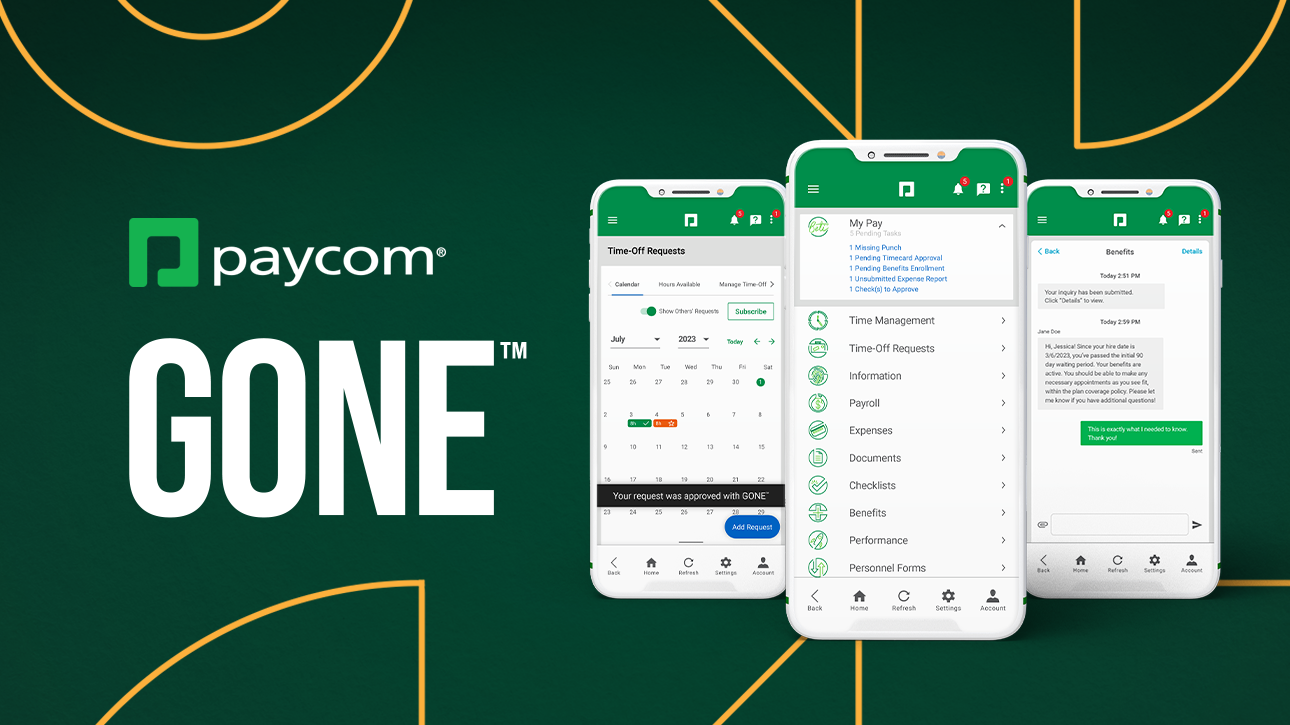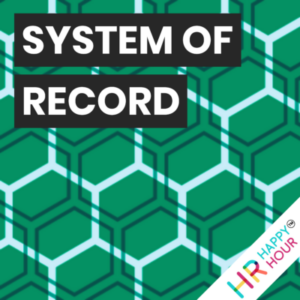HR Technology News: Paycom’s GONE™ Time Off Request Automation Empowers Employees and Supports Managers
December 5, 2023
Since the publication of Drive: The Surprising Truth About What Motivates Us by Daniel Pink in 2009, the concept of autonomy as a key factor in sustaining employee motivation has been popularized and generally accepted by HR leaders. The importance of autonomy can perhaps be best understood by examining the opposite of employee autonomy – micromanagement.
Many of us have experienced micromanaging at some point in our careers – situations where the manager or boss exerts too much control and excessive oversight over employees. Micromanaging leaves employees frustrated, uncertain, disengaged, and potentially leading them to seek other employment opportunities.
Despite best efforts, and what we all know to be true, it seems something is always getting in the way. Some business owners and leaders are convinced only they know best and understand how work needs to be done and are reluctant to cede much control to even managers, let alone employees.
Additionally, entrenched processes that are in desperate need of redesign can work to reduce employee autonomy. In the HR domain alone, we still see hiring processes requiring five or more rounds of candidate interviews before a hiring decision is made; job posting approval processes that require sign off from multiple levels of management prior to even running a job advertisement; or lengthy meetings with multiple participants for even the smallest, simplest HR initiatives and programs.
And the HR technology domain too has traditionally contributed to the basic lack of employee autonomy. While data privacy and data security concerns are valid and necessary, they have often been used as a basis for overzealous restriction of employee access to data, in some cases even their own data, resulting in employees having to ask permission or get assistance for basic transactions or answers to simple questions.
While moving and changing organizational culture is challenging, and updating and modernizing legacy processes can also be slow, fortunately for many organizations, new innovations in HR technology are serving to empower employees and the business, giving them enhanced access and control of their data, and support the ideal of increased employee autonomy. I’d like to share one of the most recent innovations in HR technology that illustrates this concept – Paycom’s GONE™ solution.
The team at Paycom has been at the forefront of many of the recent HR technology innovations that empower employees and foster autonomy. With their groundbreaking payroll product, Beti®, which puts control and approval of an employee’s payroll in their own hands was released, it marked a significant leap forward. It illustrated how an HR technology can support employees, giving them ownership and control of their data, and benefit the organization from a reduction in errors, corrections, and streamlined processing.
Paycom’s newest HR tech innovation GONE which follow’s in Beti’s footsteps providing enhanced transparency, confidence, and control to the employee, while generating important efficiencies for the organization.
Paycom’s GONE , newly released to the market, takes away the time-consuming task of managers manually approving or denying basic time-off requests from employees. By helping the organization configure their rules and policies for employee time off, the GONE solution ensures business needs are met, policies are maintained, and allows supervisors to focus more on strategic initiatives to support their business strategy. The time saved also allows them to serve more as leaders and coaches, and less as transactional or even micromanagers.
Here is how GONE works:
First, the organization configures rules establishing the parameters governing how employee time-off requests can be fairly and consistently auto-approved or denied.
Then, when employees submit their time off requests, the specifics of the requests are evaluated against the rules and policies of the organization, and they will see either a “This request is likely to be approved with GONE™”, “This request is not Likely to be approved with GONE™” or “This request is likely to be approved or denied at a later date with GONE”™ message (for pending requests subject to how the organization has configured GONE), before submitting the request.
Next, the time off request is either instantly approved or denied based on the results of the evaluation of the company rules, or placed on hold until the request is within the appointed time frame to submit and receive an answer. All this happens without managers having to login, review the time-off policy, and then make a decision on the request manually.
Additionally, the employee can request a review of a denied request and if the manager decides to override GONE’s auto-decision they can do so easily along with adding a note for the reversal, which will display to the employee with their notification.
So, with the application of a few business rules, suddenly the approval of employee time off requests will be accelerated, the rules will ensure consistency and fairness in the application of the company time off policies, and employees will feel empowered by not having to track down managers and solicit their approvals – important when data shows that nearly half (49.4%) of U.S. employees want their managers to approve PTO requests within 1 business day.
Automating and streamlining the time off request approval process will result in several important benefits. The organization will benefit from making certain critical business needs are met by ensuring appropriate staffing levels are maintained – especially during “peak” times. From a productivity and efficiency standpoint, the entire organization will benefit from reducing a manager’s time to conduct manual approval/denial tasks. Finally, with decision rules and criteria, GONE will ensure standardization across the company, prevent discrimination, and protect compliance with organizational policy, which benefits everyone – leadership, managers, and employees.
Behind the scenes, GONE allows the organization to configure complex rules if they care to, governing and controlling the automation of approvals of time off requests, making GONE™ a robust solution. And when you think about it, in a manual approval process, managers often must evaluate these complex criteria and decision factors in their heads – all while keeping employees waiting for a decision, and still having to juggle all their other responsibilities. And as organizations welcome more and more Gen Zers into their workforces, I don’t have to mention how important fast feedback, immediate action, and transparent communication is valued, and expected, by these workers.
To sum up, employees benefit when the organization empowers them. And having more ownership, control, visibility, and transparency around an important process like time off is a significant benefit for them, and one that allows them to manage their work and outside of work lives more effectively. GONE benefits the organization by ensuring that necessary staffing levels are maintained, rules and policies are enforced fairly and consistently, and by improving productivity by reducing processing time and eliminating manual processes. Like Beti before it, GONE sets a standard for the intelligent and thoughtful application of HR technology to empower people, simplify processes, and help organizations meet their important goals.
Learn more about GONE at – www.paycom.com.
How we can help
Led by Trish Steed and Steve Boese, H3 HR Advisors harnesses over 40 years of experience to delivery HCM insights and guidance to global organizations.
H3 HR Advisory services
By leveraging technology, analytics, and our deep industry knowledge we can help you to reposition your workforce and ensure that you have the right people with the right capabilities in the right roles to positively impact the growth of your business.
HR Happy Hour Podcast Network
Created in 2009, The HR Happy Hour Show is hosted by Steve Boese and Trish Steed and is the longest continuously running internet radio show and podcast on Human Resources, HR Technology, Talent Practices, Workplace and Leadership topics.
H3 HR Speaking Services
We work closely with every client to customize your content - keynotes, webinars, research, infographics, and buyer’s guides - to inspire, educate and inform the audience enabling you to reset and realign your organization for a talent-led breakthrough.
Get in touch
Talk to us today and find out how we can help you and your organization leverage HCM technology to attract, onboard, retain and manage top talent.




